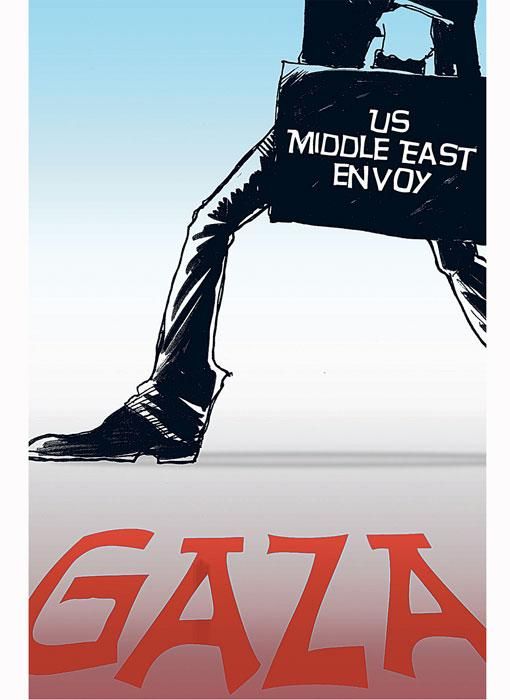Her watery eyes drooping, a Palestinian tenderfoot stood atop the rubble from her home which was totally demolished by the Israeli bombing during its 23-day assault on the Gaza Strip. She was searching for any mementoes that belonged to any member of her family, all 11 of them who were killed in the merciless killing. She found a shirt that belonged to her father, then a book of her brother and so on.
The heart-wrenching scene on Aljazeera television network, which has done an unparalleled job of reporting on the carnage, was interrupted when she saw her light brown cat crawling out of its hideout within the demolished house towards her. Teary-eyed, Dahlia rushed to her cat, picked her up and hugged her intimately, kissing her all over - all the eyes of the viewers in my home in a Washington suburb swelled up, unable to hold back this stomach-turning episode.
There were other scenes of traumatised children, one complaining that he couldn't find any of his school books because his school, one of the UN-run institutions in Gaza which has been bombed by Israeli fire, was scheduled to reopen once the ceasefire took effect; and another infant was searching for her toys.
But what was most impressive about these youngsters was their resilience, all amazingly determined to carry on, eloquent in their reporting of what occurred during these horrible 23 days and all pledging their steadfastness and commitment to remain despite the carnage in their homeland, an area that is slightly more than twice the area of Washington, DC, about 365 square kilometers. The latest figures are that about 440 children were killed and 600 others wounded, half of them needing urgent psychotherapy.
If nothing else, this was one more attestation to the accepted conclusion that Israel had miserably failed in its inhuman operation in the Gaza Strip to eliminate Hamas. If anything, the reverse emerged. Hamas's rival, Fatah, who is in control of the Israeli-occupied West Bank and its leader, Mahmoud Abbas, president of the Palestinian National Authority, have been diminished in Palestinian eyes especially that Abbas's year-long negotiations with Israel have yielded nothing. In fact, the Israeli colonies enterprise in the West Bank has expanded; even the so-called "illegal" Israeli outposts have not been eliminated as repeatedly promised by Israel and urged by the Bush administration.
All eyes are now focused on the new ideas from US President Barack Obama's administration and its reaction to these bankrupt Israeli policies. For a start it cannot return to the ineffective steps of past administrations; the US ought not to block all attempts to bring Israel before a court of law for the massacre it has inflicted in Gaza where more than 1,300 Gazans have lost their lives and over 5,500 have been injured, as well as the demolition of thousands of homes, several schools and mosques, and a university. There should be no hesitation about this matter.
Obama's laudable decision to appoint a respected American leader, George Mitchell, the US Middle East envoy, rather than the old guard of previous administrations ought to be immediately followed by more promising and constructive gestures. For example, US financial assistance to help in the reconstruction should top the list to help the impoverished and densely populated Gaza Strip.
Regrettably, a more symbolic gesture would have been a spot-check of the devastated areas by Mitchell, but this seems not to be in the works. Such a visit would have elevated the American image which has been hurt by the failed policies of the Bush administration.
Nevertheless, Secretary of State Hillary Clinton or even Obama should consider going there; after all, the American president had visited Sderot, the Israeli border town that has been the target of ineffective shelling from Gaza. (Seriously overlooked here has been the fact that it was Israel which had violated the Gaza truce when it launched a cross-border attack last November, killing several Palestinians, an incident that touched off the continued shelling of Israeli towns).
Although the Obama administration is now awaiting Mitchell's report after "listening" to his Arab and Israeli hosts, it must be underlined here that an important actor in the Palestinian-Israel conflict, whether one likes it or not, is Hamas which is usually dismissed (by Israel and its supporters) as a terrorist organisation. In contrast, no such pejorative term is applied to the ugly actions of the Israeli war machine when it attempts to wipe out Palestinian society, the only factor that promotes anti-Americanism in the region.
"It should be remembered," wrote Stephen Zunes, chair of Middle Eastern Studies at the University of San Francisco, in Foreign Policy in Focus, "that Palestinian land is being occupied, confiscated, and colonised, not Israeli land; that Israeli military and economic power is greater than that of the Palestinians; that Palestinian civilians have been killed in far greater numbers than Israeli civilians; and that it's the Palestinians and not the Israelis who have been denied their fundamental right of statehood."
This is what Mitchell would have noted were he to make a right turn after visiting Israel and report back to his leader in Washington.
George Hishmeh is a Washington-based columnist. He can be contacted at ghishmeh@gulfnews.com








